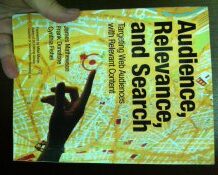 A few months ago, the PR folks working with IBM Press sent me a copy of “Audience, Relevance and Search: Targeting Web Audiences with Relevant Content” by a trio of authors: James Mathewson, Frank Donatone and Cynthia Fishel. I have somewhat of a connection with IBM Press because of editing the Social Media Marketing chapter of Mike Moran and Bill Hunt’s Search Engine Marketing Inc., 2nd Edition. (Interview)
A few months ago, the PR folks working with IBM Press sent me a copy of “Audience, Relevance and Search: Targeting Web Audiences with Relevant Content” by a trio of authors: James Mathewson, Frank Donatone and Cynthia Fishel. I have somewhat of a connection with IBM Press because of editing the Social Media Marketing chapter of Mike Moran and Bill Hunt’s Search Engine Marketing Inc., 2nd Edition. (Interview)
Funny Story: Fast forward to Oct 13th and I’m on my way through the MSP airport to catch a plane to Las Vegas where I’m speaking at Blog World New Media Expo. I complain on Twitter about $36/day parking (highway robbery in my book) and James Mathewson chimed in with advice on parking at Terminal 2. Ironically, the book I picked out to read on the plan was Mathewson’s “Audience Relevance and Search”. On top of that, James is a fellow Minnesotan and we’ve never met or had any kind of correspondence before. Writing this review was simply meant to be 🙂
Essentially, “Audience, Relevance and Search” is a book for folks in the content creation business to better understand writing for the web. More specifically, writing for search engines.
Many online marketers, myself included, evangelize “write for people first”. The authors of this book put a lot of faith in Google’s ability to emulate the information understanding needs of searchers and therefore focus on writing for search engines first.
A point of clarification: When I advise people to write for people first, then search engines, I’m talking about writing content in a way that is designed to guide the reader to a particular outcome. The content should be able to stand on its own, regardless of the source that brought the visitor to it.
This is in contrast to some who write for search engines only, resulting in keyword stuffing, nonsensical passages and other tactics simply to rank highly in search results. Of course, that’s not the kind of “search engines first” writing Mathewson, Donatone and Fishel are talking about.
The book discusses how to understand customers through search and social keyword research and writing copy according to how best to connect with web content consumption, which is decidedly different from pring.
The first chapter covers the essence of the entire book from keywords to information architecture to social media to measuring the success of web content. Advice is not too dissimilar that what you’d find in better blogs that cover these topics but one thing I found interesting was Chapter 2: “How the Web Medium Has Evolved from Its Oral and Print Origins”.
There are strong academic influences to the writing style and topic of this book. Chapter 2 is certainly a good example of that and provides some interesting context for how different web writing is from print. In particular, that web content is unstructured, meaning on the web is determined by the reader not the writer, the reader is in control of the story not the writer and that web writing is never finished.
If you’ve read one of my favorite books, Search Engine Marketing Inc, then you should know that Audience, Relevance and Search is a great complement to it. It drills into the importance of meaning, context and purposefulness of writing for the web.
Many writers produce content in situations where the primary medium is traditional, like print. That same content is also published to the web. That scenario is not writing for the web. This book will help content creators understand how to write specifically for web audiences and incorporate search friendly perspectives througout.
The effect of better understanding such web content creation, especially across and organization, is the effect of operationalizing SEO. Instead of having a SEO “optimize” content as an extra step in the content process, following the advice in this book should help websites create optimized content from the start, saving time, likely money and increasing website marketing performance.
The best thing about this book is that it’s a good primer for the mechanics of implementing a Content Marketing strategy that places importance on the value of Search Engine Optimization and Social Media. If those are goals for your online marketing efforts, then this book is worth checking out: IBM Press.


